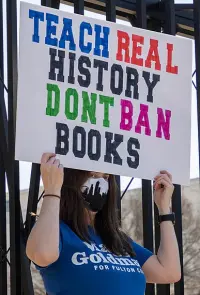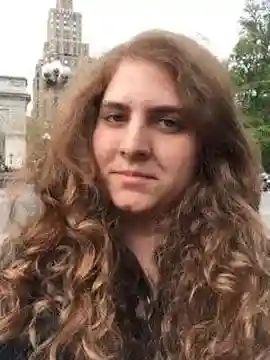Image via Wikipedia Commons
More.
That’s the theme of 2023 when it comes to book bans: more. There have been more challenges, more protests, more pieces of legislation than there have been in the recent past.
Dr. Tasslyn Magnusson, a writer who has been working with PEN America since 2021 to track book challenges, spoke with me for this article and said she has noticed patterns in terms of which books are being challenged. Attacks are often targeted at certain identities. “So predominantly LGBTQ narratives and characters and people of color — characters and stories,” Magnusson said. “[It goes] back and forth between which is the number one.” She added that any stories around themes of sexual identity or coming of age are also targeted.
According to PEN America, there were 2,532 instances of book bans between July 2021 and June 2022. This number is staggering, especially when you consider these are just the bans PEN America is aware of — it’s unclear how many challenges and bans there are that haven’t been reported.
It makes you wonder — if things have gotten worse in the past few years, what will 2023 hold for books, authors, and readers? Will we see more bans, more legislation aimed at eradicating certain identities?
In addition to Magnusson, I also spoke to librarian Alex Brown, who has been vocal about this issue on social media. Together, the two experts painted a sobering picture of the year to come.
“I would love to be super positive and say it’s gonna get better,” Brown said. “We’ve got a long way to go before we start pulling ourselves out of it. It’s gonna get worse. We've been lucky in that a lot of bills have been stopped. If our luck runs out, we’re gonna end up with situations where library workers and teachers are gonna get arrested.”
Magnusson had a similar take: “I think we’re gonna see a concerted effort to change laws in tandem with more stress on the system of school libraries. We’re gonna see people who are working at the state legislatures — a rash of anti-trans legislation — usually anti-trans book bans and education monitoring, videos & cameras and other ways to peer at children.”
What was clear from my conversations with both Magnusson and Brown is that while this is about books, it’s not only about books.
“A common mistake is looking at this as just banning books — [because] it’s part of the trans bans, the Don’t Say Gay bills…a new frontline in the battle,” Brown said. “[It’s] all part of the same process. You cannot talk about book bans without talking about anti-trans, anti-gay, anti-CRT legislation.”
One of the tactics currently being used, according to Brown, is to give book bans a certain cover of respectability — groups like Moms for Liberty are claiming to fight against porn in books for children. But when you look deeper, you see that the “porn” they are calling out is really just the existence of queer people. The “CRT” messages are just honest portrayals of the racism that has underpinned much of American history.
“[It’s] a way of pulling outsiders into your extremist positions without them realizing that they’re being pulled in,” Brown said. “As a school librarian, I also don’t want porn in libraries. I spent a lot of years in school to [learn how to avoid] that.” My conversation with Brown included an honest talk about the demoralization they, and countless other librarians and educators, are feeling.
“Burnout is a big [effect],” Brown said. “It’s really hard to do your job when you have Fox News telling you that you’re trying to destroy children by existing…”
 In addition to the emotional weight of the challenges, there’s the literal time and effort it takes to react to them — having to review books, pull them from shelves, spend time fighting bans that could have been better spent on programming to help patrons and students.
In addition to the emotional weight of the challenges, there’s the literal time and effort it takes to react to them — having to review books, pull them from shelves, spend time fighting bans that could have been better spent on programming to help patrons and students.
On top of that, both Brown and Magnusson mentioned there is actual legislation following the bans. “[There are] actual lawsuits and arrests,” Brown said. “North Dakota was threatening to arrest and jail [people] for 10 years. There are going to be people … the only way you challenge that is to get arrested and go to court and hope you can challenge that law as unconstitutional.”
Magnusson also spoke about this aspect, saying she initially thought these laws wouldn’t pass because they’re unconstitutional, but has learned: “There has to be people to bring a suit, go through the process. Generations of students [will be] going through high school without access to queer literature. James Baldwin got chucked out of a school in Florida…”
This seems like a good place to point out that book bans are never good. They have a negative mental health effect on authors, for one, but they’re also incredibly damaging for the teens who are seeing their identities banned. For every book that sees a bump in publicity and status because of a ban, countless other books simply disappear, their authors unable to make a living, the kids whose stories they tell unable to see themselves.
So what can we do? Those of us who see the importance in books, in diverse identities, who don’t want queer people, disabled people, people of color, to disappear?
We have to fight back. Magnusson said to “look for the people who are already doing the work and ask how you can support and amplify their message.” No matter where you live, there are likely people and organizations already working to fight book bans; reach out to them, see how you can help support their work.
Brown added to, “go to school board meetings, city council meetings, [you] have to go and be active. For libraries and public libraries and schools, posting comments on Facebook and Instagram helps — if they do something good, comment, email the director, uplift. Not just fighting back against the negative but supporting the positive. Don’t just show up to the library and congratulate the librarians. Make sure the people in charge know.”
Libraries can always use funding support as well, from those who have money to spare.
Ultimately, Brown said, “We can do this. We can get out of it. It’s just gonna take work.”
Protest image via Wikipedia Commons

About the author
Karis Rogerson is a mid-20s aspiring author who lives in Brooklyn and works at a cafe—so totally that person they warn you about when you declare your English major. In addition to embracing the cliched nature of her life, she spends her days reading, binge-watching cop shows (Olivia Benson is her favorite character) and fangirling about all things literary, New York and selfie-related. You can find her other writing on her website and maybe someday you’ll be able to buy her novels.








